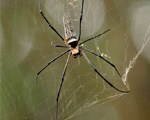Children are not born with a dread of snakes or spiders but learn these fears very quickly.

Snakes and spiders are the objects of two of the most common fears and phobias throughout the world. One theory about why we fear spiders and snakes is because so many are poisonous; natural selection may have favoured people who stayed away from these dangerous creatures. Indeed, several studies have found that it's easier for both humans and monkeys to learn to fear evolutionarily threatening things than non-threatening things.
To test whether infants are born with their threat or learn these fears, researchers performed two experiments. In one experiment from the study, the researchers showed two videos side by side to children as young as 7 months. One video showed a snake and the other showed something non-threatening, such as an elephant. At the same time, the infants heard a recording of either a happy or fearful voice. The infants spent more time looking at the snake video when they heard a fearful voice, but the children showed no sign of fear themselves.
In another experiment, 3-year-olds were shown a screen of nine photographs and asked to select a target item. The children identified snakes more quickly than flowers and more quickly than other animals that look similar to snakes, such as frogs and caterpillars. Children who were afraid of snakes identified snakes just as quickly as did children who did not have that fear.
The results suggest that we have these biases to detect things like snakes and spiders really quickly, and to associate them with things that are bad, like a fearful voice.
Earlier research showed that adults quickly recognise the difference between scary and not-so-scary creatures. This new study confirmed that children do the same, but that it's a learned, not an innate response.
DoctorNDTV is the one stop site for all your health needs providing the most credible health information, health news and tips with expert advice on healthy living, diet plans, informative videos etc. You can get the most relevant and accurate info you need about health problems like diabetes, cancer, pregnancy, HIV and AIDS, weight loss and many other lifestyle diseases. We have a panel of over 350 experts who help us develop content by giving their valuable inputs and bringing to us the latest in the world of healthcare.












